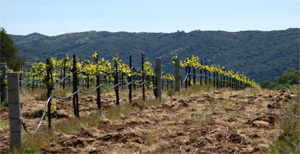Understanding the Terms

It’s hard to open a magazine, newspaper or even turn on the TV without hearing the word “organic”, “natural”, “green” or “sustainable”. Whenever possible, we like to try to educate on the terms “organic wine” and “wines made from organically grown grapes” so that people can begin to understand the nuances between the two. To this end, we thought it would be helpful to provide wine lovers with a list of definitions surrounding the myriad terms we see in the market place today.
When visiting your local wine store, you will most likely see a variety of seals/certifications on the wines in this section (more domestic organic wines carry certifications than European wines, although many European vineyards have been farming without chemicals for centuries). Below is a brief overview of what these certifications/seals mean:

USDA Organic Seal: When you see a wine carrying this seal, it tells you that NO SULFITES have been added during the winemaking process. While there are naturally occurring sulfites in all wines, wineries that apply this seal cannot add any sulfites to their wine. Additionally, for wines to carry this seal, both the vineyards where the grapes are grown and the winery facility where the wines are made, must be certified organic. These wines are, by USDA definition, organic wines.

CCOF (California Certified Organic Farmers): The CCOF is another certifying agency (accredited by the USDA) that requires that both the vineyards and the winery be certified organic in order to carry their seal. In accordance with CCOF regulations, wineries that use the term “Made With Organic Grapes” on the front of their label are only allowed to contain less than 99 ppm (parts per million) of sulfites in the winemaking process. Barra and Girasole Vineyards wines all carry the CCOF certification on the back label.
 Vegan wines: In order for a wine to qualify for vegan status, there can be no use of animal products in the winemaking process (e.g. egg-whites or edible gelatins) Both organic and non-organic winemaking practices sometimes employ fining techniques. Fining wine refers to the process of purifying the wine to remove or reduce any unwanted matter from the wines, and is also done to reduce astringency in red wines. If Barra and Girasole wines need to be fined (which not every vintage/varietal does), we do not use any animal products in the process. Instead, a bentonite clay is used.
Vegan wines: In order for a wine to qualify for vegan status, there can be no use of animal products in the winemaking process (e.g. egg-whites or edible gelatins) Both organic and non-organic winemaking practices sometimes employ fining techniques. Fining wine refers to the process of purifying the wine to remove or reduce any unwanted matter from the wines, and is also done to reduce astringency in red wines. If Barra and Girasole wines need to be fined (which not every vintage/varietal does), we do not use any animal products in the process. Instead, a bentonite clay is used.
 Sustainability In Practice (SIP): SIP certified brands use third party-verified sustainable practices. For a list of those practices, click here. Unlike wines make with certified organic grapes, SIP-certified brands are allowed to use Glyphosate (a.k.a. RoundUp) in the vineyards.
Sustainability In Practice (SIP): SIP certified brands use third party-verified sustainable practices. For a list of those practices, click here. Unlike wines make with certified organic grapes, SIP-certified brands are allowed to use Glyphosate (a.k.a. RoundUp) in the vineyards.
 National Organic Program: Created by the USDA, the National Organic Program is the governing body for all organic foods. See click here for more information on NOP rules and regulations.
National Organic Program: Created by the USDA, the National Organic Program is the governing body for all organic foods. See click here for more information on NOP rules and regulations.
 Non-GMO wine: GMO products (ingredients or processing aids) are not allowed in products labeled as organic/made with organic. Because our wines are CCOF certified, they are therefore GMO-free.
Non-GMO wine: GMO products (ingredients or processing aids) are not allowed in products labeled as organic/made with organic. Because our wines are CCOF certified, they are therefore GMO-free.
Sulfites:Yeasts naturally produce sulfites during the fermentation process. Sulfites act as preservatives for wine, allowing for stability and longevity. The FDA allows traditional wines to contain up to 350 ppm of sulfites. Wines made with organic grapes, such as Girasole Vineyards, must not exceed 99 ppm of sulfites.
